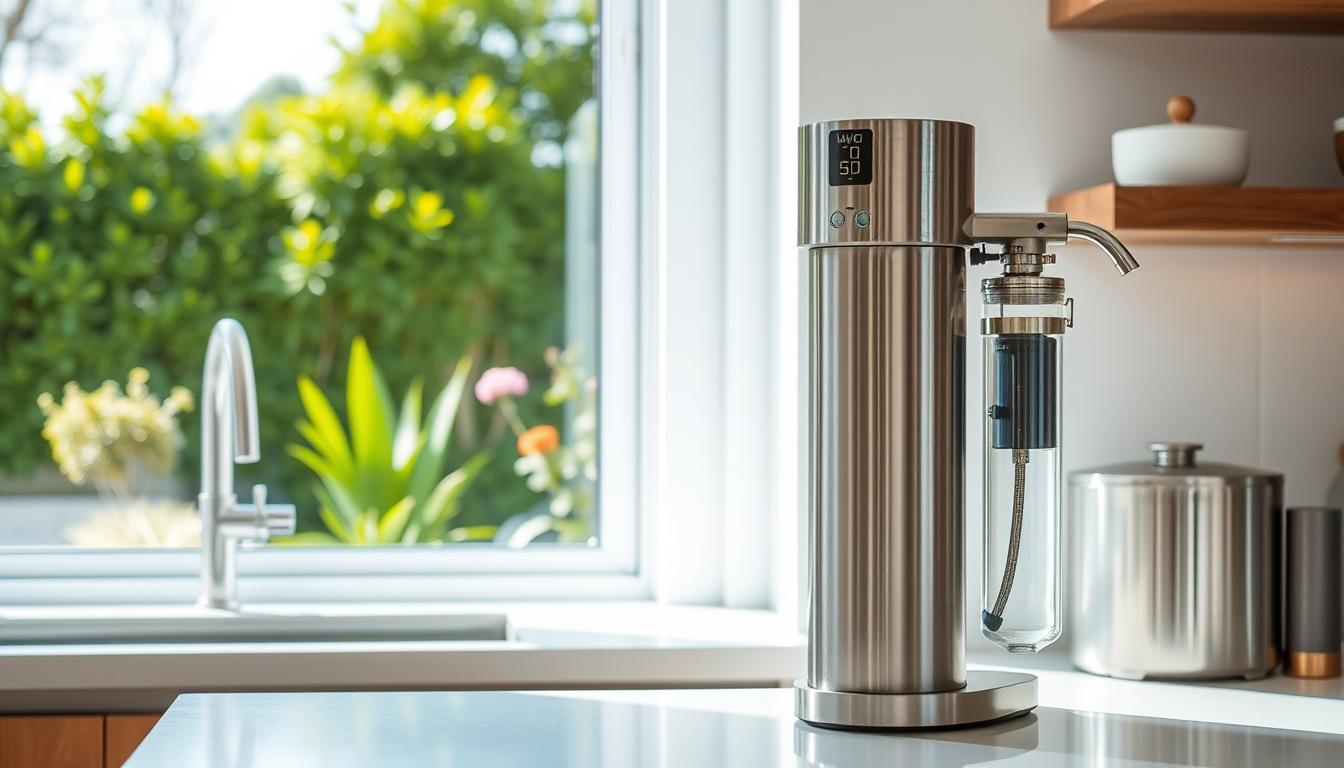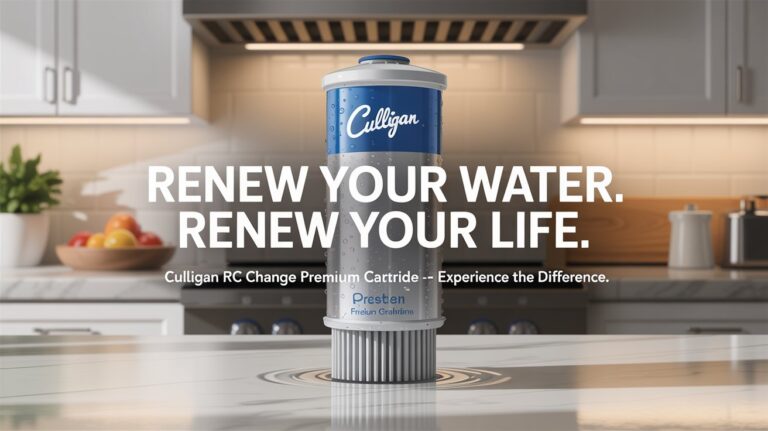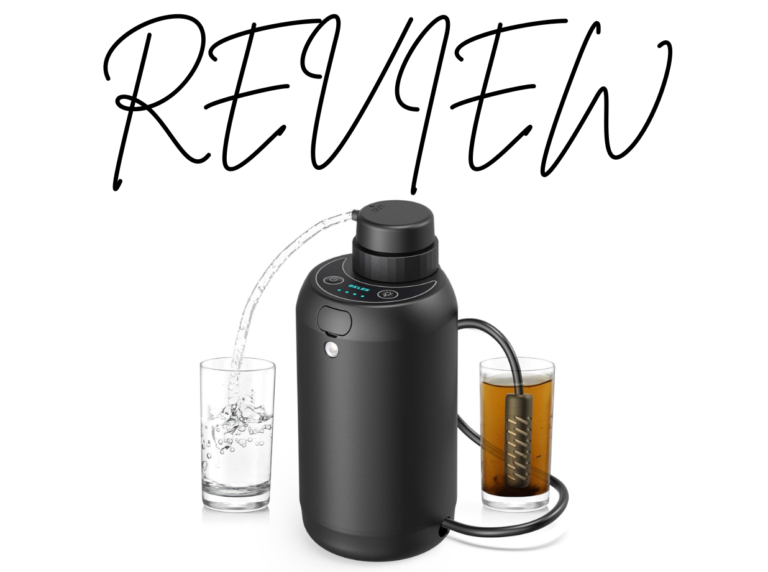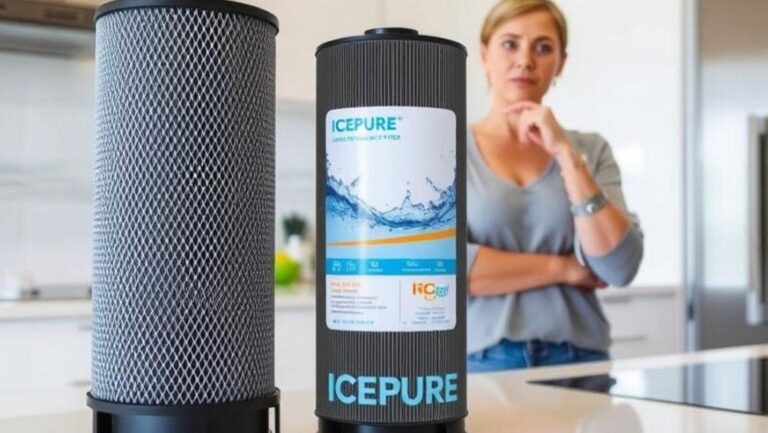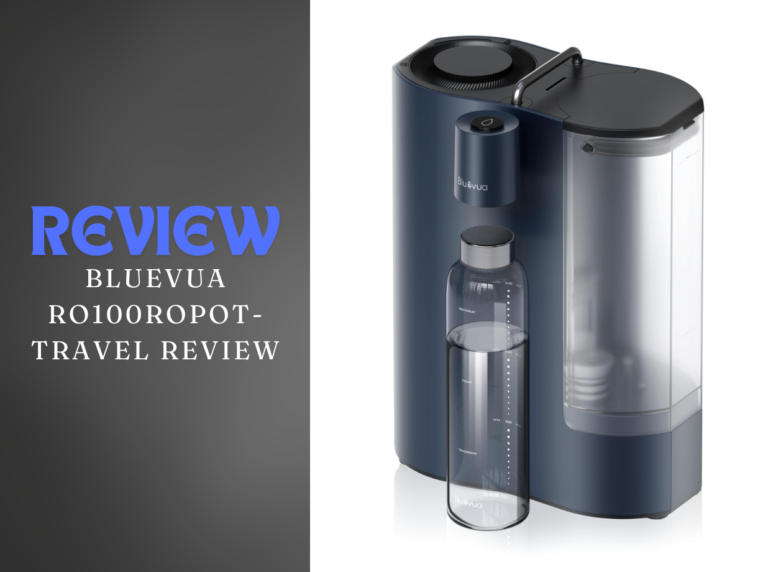7 Ways a Home Water System Can Save You Money
Are you aware of the significant impact a home water system can have on your household expenses? With the average American family using over 300 gallons of water per day, finding ways to reduce consumption is crucial.
Installing a cost-effective water solution can make a substantial difference. Not only can it help lower your water bills, but it also contributes to a more sustainable future.
A home water system offers numerous benefits, from reducing bottled water expenses to minimizing health-related costs. By understanding the different types of systems available, homeowners can make informed decisions about their water usage.
Key Takeaways
- Reduce your water bills with a home water system
- Lower your bottled water expenses
- Minimize health-related costs
- Contribute to a more sustainable future
- Make informed decisions about your water usage
Understanding Home Water Systems
With the growing concern over water quality, understanding home water systems is crucial for homeowners. These systems are designed to improve the quality of water in your home, making it safer for drinking, cooking, and other uses.
What is a Home Water System?
A home water system is a device or set of devices that work to purify and improve the quality of water in your home. It can remove contaminants, improve taste, and even soften water to prevent scaling in appliances.
Types of Home Water Systems Available
There are several types of home water systems available, each with its unique benefits. The most common types include:
- Filtration Systems
- Water Softeners
- Reverse Osmosis Systems
Filtration Systems
Filtration systems are designed to remove contaminants from your water, improving its taste and safety. They can be installed at the point of entry or at specific faucets.
Water Softeners
Water softeners work by reducing the mineral content in water that causes scaling. This can extend the life of your appliances and plumbing.
Reverse Osmosis Systems
Reverse osmosis systems provide comprehensive water purification by forcing water through a semi-permeable membrane, removing a wide range of contaminants.
The Rising Cost of Water in American Households
The cost of water in American households is on the rise, driven by various factors including infrastructure upgrades and water scarcity issues. This increase is affecting household budgets across the country, making it essential for homeowners to understand the trends and factors influencing their water bills.
Current Water Utility Trends
Water utility trends show a consistent rise in costs due to the need for infrastructure upgrades and the growing issue of water scarcity. According to recent data, these trends are expected to continue, impacting household expenses. Implementing cost-effective water solutions can help mitigate some of these rising costs.
Factors Affecting Water Bills
Several factors contribute to the rising cost of water in American households. These include regional price variations and seasonal changes in water costs. Understanding these factors can help homeowners anticipate and manage their water expenses more effectively.
Regional Price Variations
Regional price variations play a significant role in determining water costs. Areas with higher water scarcity or more extensive infrastructure needs tend to have higher water prices. For instance, regions experiencing drought may see increased water costs due to conservation efforts.
Seasonal Changes in Water Costs
Seasonal changes also impact water bills, with costs often rising during summer months due to increased water usage for gardening and other outdoor activities. By adopting money-saving water treatment options, households can reduce their water expenses regardless of the season.
By understanding the factors that influence water costs and implementing appropriate solutions, households can better manage their water expenses and potentially save money.
7 Ways a Home Water System Can Save You Money
Installing a home water system can be a game-changer for homeowners looking to cut costs. By understanding the various ways a home water system can save money, homeowners can make informed decisions about their investment.
Overview of Cost-Saving Benefits
A home water system offers numerous cost-saving benefits, including reduced bottled water expenses, lower energy bills, and extended lifespan of plumbing and appliances. Some of the key benefits include:
- Reduced water consumption
- Lower utility bills
- Less money spent on bottled water
- Extended appliance lifespan
Understanding Return on Investment
Understanding the return on investment (ROI) of a home water system is crucial for homeowners. By analyzing the short-term and long-term savings, homeowners can calculate their break-even point and make informed decisions.
Short-Term vs. Long-Term Savings
While there may be initial costs associated with installing a home water system, the long-term savings can be substantial. Homeowners can expect to save money on their water bills and reduce their maintenance costs over time.
Calculating Your Break-Even Point
To calculate the break-even point, homeowners should consider the initial cost of the system, installation costs, and ongoing maintenance expenses. By comparing these costs to the expected savings, homeowners can determine when they will start seeing a return on their investment.
1. Reducing Bottled Water Expenses
One of the most significant advantages of installing a home water system is the potential to drastically cut down on bottled water expenses. The average American spends around $100 per year on bottled water, a cost that can be significantly reduced with a home water system.
The Hidden Costs of Bottled Water
Bottled water expenses are not just about the water itself; there are several hidden costs associated with it. Understanding these costs can help homeowners appreciate the value of a home water system.
Environmental Impact Costs
The production, transportation, and disposal of bottled water have significant environmental impacts. The environmental cost of bottled water includes the energy used in production, the carbon footprint from transportation, and the waste generated by plastic bottles. By switching to a home water system, households can reduce their environmental footprint.
Convenience Premium Pricing
Bottled water often comes with a convenience premium, making it more expensive than tap water. This premium pricing is due to the convenience of having water readily available in bottles. A home water system eliminates the need for this convenience premium.
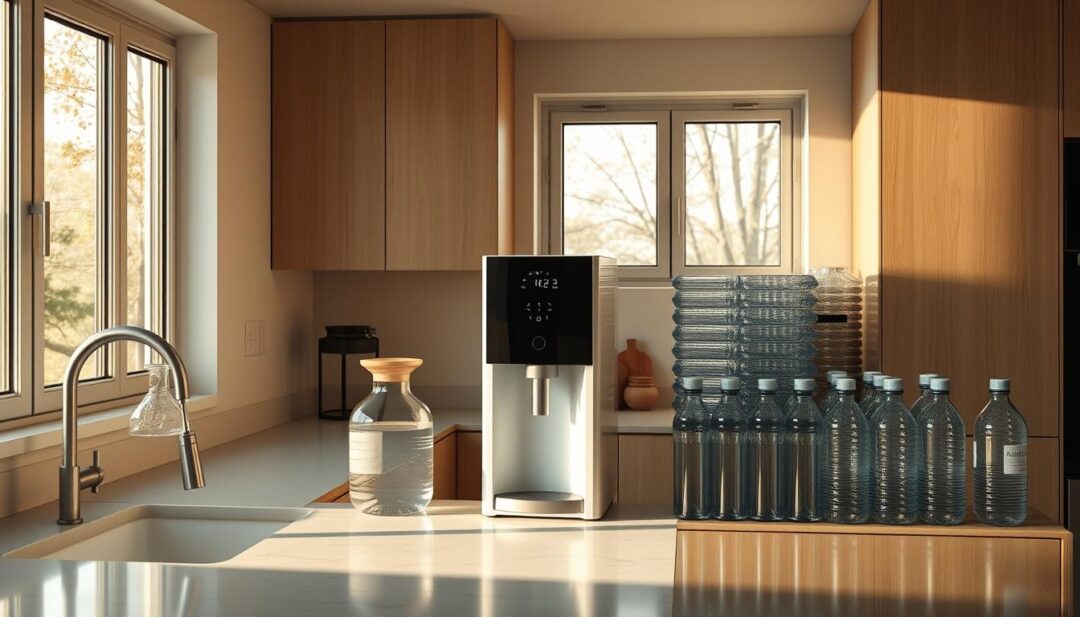
Calculating Your Annual Bottled Water Spending
To understand the potential savings, it’s essential to calculate your current annual spending on bottled water. Factors such as family size play a crucial role in this calculation.
Family Size Considerations
Larger households tend to spend more on bottled water due to increased consumption. By installing a home water system, larger families can save significantly on their annual bottled water expenses.
Real-Life Savings Examples
For instance, a family of four that consumes two bottles of water per day can spend around $500 annually on bottled water. By switching to a home water system, they can potentially save $400-$500 per year, depending on the system’s efficiency and their consumption habits.
By understanding the hidden costs of bottled water and calculating your annual spending, you can make an informed decision about investing in a home water system. This not only helps in reducing expenses but also contributes to a more sustainable lifestyle.
- Reduce your annual bottled water expenses
- Lower your environmental footprint
- Save on the convenience premium associated with bottled water
2. Extending the Lifespan of Plumbing and Appliances
Hard water can wreak havoc on your plumbing and appliances, but a home water system offers a solution. By installing a water softener or other treatment system, you can mitigate the damaging effects of hard water and extend the lifespan of your home’s infrastructure.
How Hard Water Damages Your Home Systems
Hard water contains high levels of minerals such as calcium and magnesium, which can lead to scale buildup and corrosion in your plumbing and appliances. This can result in costly repairs and premature replacements.
Scale Buildup Effects
Scale buildup can reduce water flow, decrease appliance efficiency, and even cause complete system failures. For instance, a water heater can be particularly affected, as scale buildup can insulate the heating elements, leading to increased energy consumption and reduced lifespan.
Corrosion Prevention
Corrosion is another significant issue caused by hard water. It can weaken pipes, leading to leaks and potentially catastrophic failures. A home water system can help prevent corrosion by removing or altering the minerals that cause it.
Cost Comparison: Repairs vs. Prevention
When considering the cost of a home water system, it’s essential to compare it to the potential costs of repairs and replacements. Preventing damage through a water treatment system is often more cost-effective than dealing with the aftermath of hard water damage.
Appliance Replacement Timelines
Appliances such as dishwashers and washing machines have shorter lifespans when exposed to hard water. By installing a home water system, you can potentially extend their operational lifespan, delaying costly replacements.
Plumbing Maintenance Savings
Regular plumbing maintenance can be expensive. A home water system can reduce the need for frequent maintenance by minimizing scale buildup and corrosion, thus saving you money in the long run.
3. Lowering Energy Bills Through Efficient Water Heating
By improving water quality, homeowners can enhance the efficiency of their water heaters, leading to cost savings. Efficient water heating is a significant aspect of household energy consumption, and optimizing this process can have a substantial impact on energy bills.
The Connection Between Water Quality and Energy Consumption
The quality of water directly affects the efficiency and lifespan of water heaters. Poor water quality can lead to issues such as scale buildup, which reduces the heater’s efficiency.
Hard Water and Heating Efficiency
Hard water, rich in minerals like calcium and magnesium, can cause scale buildup in water heaters. This scale acts as an insulator, reducing the heater’s ability to transfer heat to the water, thus increasing energy consumption. Treating hard water can mitigate this issue, improving heating efficiency.
Scale Buildup in Water Heaters
Scale buildup not only reduces heating efficiency but can also shorten the lifespan of water heaters. Regular maintenance and water treatment can prevent scale buildup, ensuring that water heaters operate at optimal levels. Proper maintenance can lead to significant energy savings over time.
Energy Savings with Properly Treated Water
Properly treated water can lead to substantial energy savings. By preventing scale buildup and maintaining the efficiency of water heaters, households can reduce their energy consumption.
Percentage Reduction in Heating Costs
Studies have shown that households can achieve a reduction in heating costs by up to 30% through proper water treatment. This percentage can vary based on the initial water quality and the type of water treatment system used.
Annual Energy Savings Calculation
To calculate the potential annual energy savings, homeowners can consider their current energy bills and the expected reduction in heating costs. For example, if a household spends $1,000 annually on energy and can reduce their heating costs by 20%, they can save $200 per year. Over time, these savings can significantly offset the initial cost of a water treatment system.
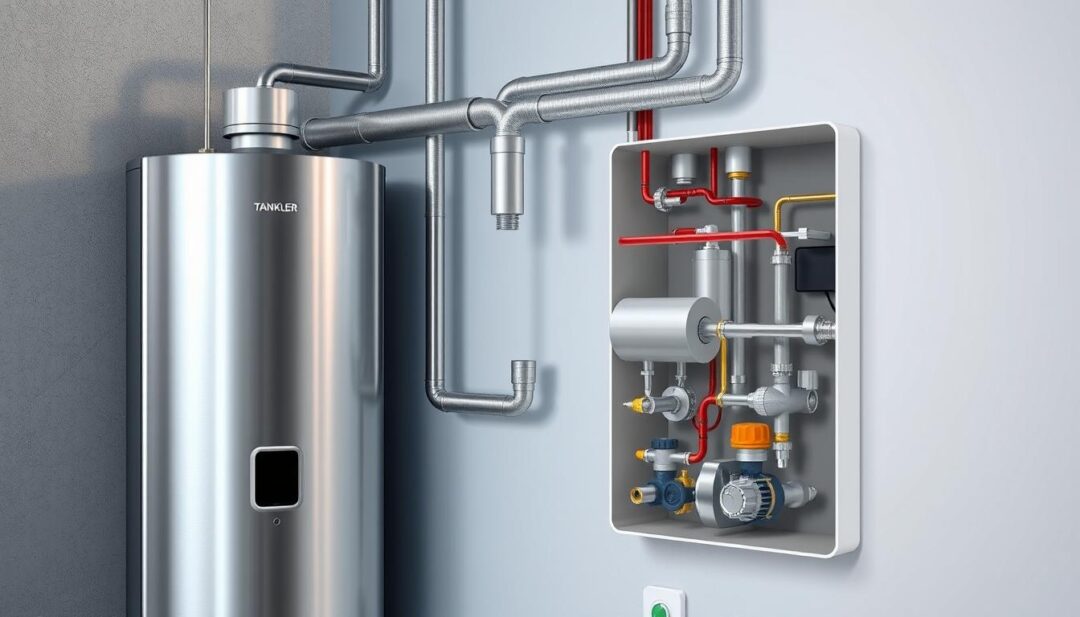
Investing in a home water system can lead to significant energy savings, contributing to the overall return on investment (ROI) for such systems. By understanding the connection between water quality and energy consumption, homeowners can make informed decisions about their water treatment options.
- Improve water heater efficiency
- Reduce scale buildup
- Lower energy bills
- Enhance overall household savings
By cutting costs with a home water system, households can enjoy not only financial savings but also the benefits of improved water quality, contributing to a healthier living environment.
4. Decreasing Cleaning Product Usage and Costs
Homeowners can enjoy a substantial decrease in cleaning expenses by installing an effective water filtration system. A home water system not only improves the quality of your water but also has a significant impact on your household cleaning product usage.
How Filtered Water Reduces Cleaning Supply Needs
Filtered water can improve the efficiency of soap and reduce limescale buildup, leading to a decrease in the need for cleaning supplies. Soft water, in particular, makes a difference in household chores.
Soap Efficiency in Soft Water
Soft water enhances soap efficiency, allowing you to use less detergent for the same cleaning results. This is because soft water contains fewer minerals that can interfere with the soap’s effectiveness.
Reducing Limescale Cleaners
Limescale buildup is a common issue in areas with hard water. By using a water softener, you can reduce the need for limescale cleaners, saving you money on cleaning products.
Annual Savings on Household Cleaning Products
By reducing the need for cleaning supplies, homeowners can save a significant amount annually. The savings come from various areas, including laundry detergent and bathroom and kitchen cleaners.
Laundry Detergent Reduction
Soft water requires less laundry detergent to achieve the same level of cleanliness, leading to direct savings on your laundry expenses.
Bathroom and Kitchen Cleaner Savings
With reduced limescale buildup, you’ll need fewer bathroom and kitchen cleaners, further adding to your annual savings.
| Area of Savings | Average Annual Savings |
|---|---|
| Laundry Detergent | $50 |
| Bathroom and Kitchen Cleaners | $30 |
| Total Savings | $80 |
5. Minimizing Health-Related Expenses
By installing a home water system, families can potentially lower their health-related expenditures. Clean drinking water is crucial for maintaining good health, and a home water system ensures that households have access to it.
Water Quality and Health Connections
The quality of drinking water has a direct impact on health. Contaminants in water can lead to various health issues, ranging from gastrointestinal problems to more severe conditions.
Contaminant Removal Benefits
A home water system effectively removes contaminants, providing clean and safe drinking water. This reduces the risk of waterborne diseases and other health complications.
Skin and Hair Health Improvements
Using filtered water for bathing and washing can also improve skin and hair health. Softened water is gentler on the skin and can reduce conditions like eczema.
Preventative Health Benefits and Cost Savings
Investing in a home water system is a preventative measure that can lead to significant cost savings. By having clean drinking water, households can reduce their reliance on bottled water for medical needs.
Reducing Bottled Water for Medical Needs
With a home water system, the need to purchase bottled water for drinking or medical purposes decreases, leading to cost savings.
Potential Reduction in Doctor Visits
By improving water quality, households may experience a reduction in doctor visits related to waterborne illnesses, further reducing medical expenses.
6. Increasing Property Value and Marketability
When it comes to selling your home, having a water system installed can be a major selling point. In today’s competitive real estate market, homebuyers are looking for properties that offer more than just the basics. A home water system can be a significant differentiator, setting your property apart from others in the neighborhood.
Home Water Systems as a Selling Point
A home water system can be a valuable feature for potential buyers, offering them the promise of clean, safe drinking water and reduced utility bills. This can be particularly appealing to health-conscious buyers or those with families.
Buyer Perception of Water Systems
Buyers perceive homes with water systems as being more luxurious and better maintained. This perception can lead to a higher willingness to pay a premium for such properties.
Marketing Your Home’s Water Quality
When marketing your home, highlighting the presence of a water system can be a key selling point. It can be featured prominently in listings and during open houses to attract more interest.
Return on Investment When Selling Your Home
Investing in a home water system can yield a significant return when you decide to sell. Not only can it increase your property’s value, but it can also help recoup the initial installation costs.
Average Value Increase Percentages
Studies have shown that homes equipped with water systems can see an increase in value of up to 5-10%. This can translate into thousands of dollars, depending on the property’s original value.
Recouping Installation Costs
By increasing your home’s value and appeal, a water system can help you recoup a significant portion of the installation costs when you sell. This makes it a savvy investment for homeowners looking to sell in the future.
Cutting costs with a home water system is not just about reducing your utility bills; it’s also about increasing your property’s value and marketability. With the potential to recoup installation costs and attract higher offers, a home water system is a wise investment for any homeowner.
7. Reducing Municipal Water Usage and Bills
By incorporating advanced water conservation features, modern home water systems can significantly lower municipal water bills. This is achieved through a combination of efficient technologies and smart management practices.
Water Conservation Features in Modern Systems
Modern home water systems are designed with water conservation in mind. Two key features that contribute to this are efficient filtration technologies and smart water management systems.
Efficient Filtration Technologies
Efficient filtration technologies play a crucial role in water conservation by ensuring that water is reused and recycled within the household. This not only reduces the demand on municipal water supplies but also minimizes wastewater.
Smart Water Management Systems
Smart water management systems utilize advanced sensors and monitoring technologies to detect leaks, monitor water usage, and optimize water distribution within the home. This proactive approach to water management helps in reducing unnecessary water waste.
Long-Term Utility Bill Reduction
The implementation of a home water system can lead to significant long-term savings on utility bills. By reducing municipal water usage, households can enjoy lower water bills over time.
Average Monthly Savings
On average, households that install a home water system can expect to save between $20 to $50 per month on their water bills, depending on their water usage patterns and the efficiency of the system installed.
Cumulative 5-Year Savings Projection
Over a 5-year period, the cumulative savings can be substantial. Assuming an average monthly saving of $35, a household can save approximately $2,100 over 5 years. This projection highlights the potential long-term financial benefits of investing in a home water system.
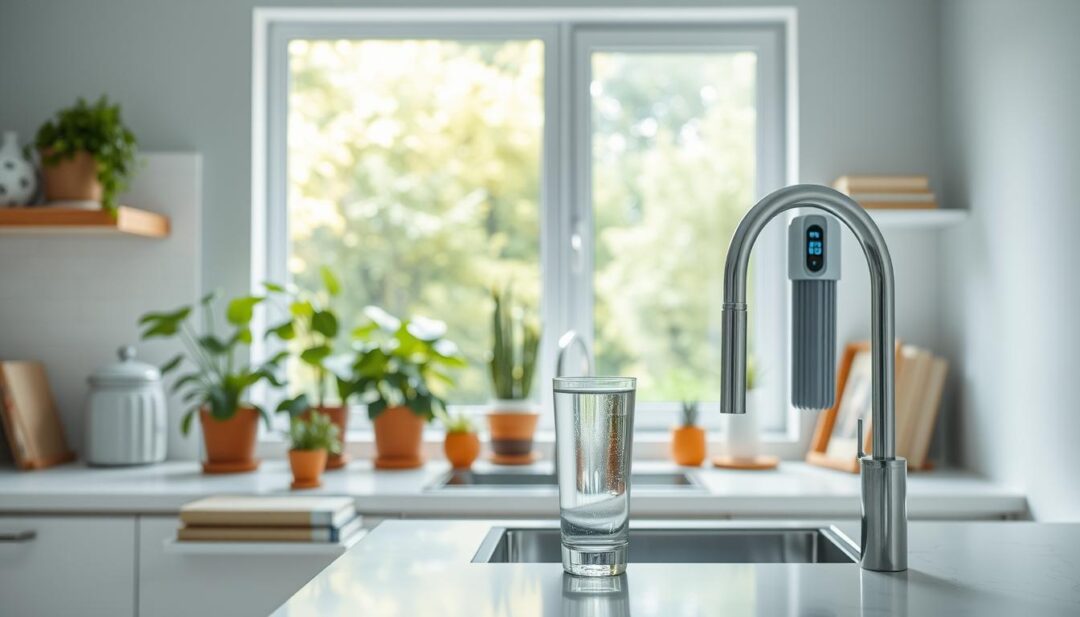
By adopting cost-effective water solutions like modern home water systems, households can not only reduce their municipal water usage and bills but also contribute to a more sustainable future. The money-saving water treatment options available today make it more feasible than ever for homeowners to invest in systems that pay for themselves over time through utility bill savings.
Choosing the Right Water System for Maximum Savings
Maximizing savings with a home water system starts with making an informed choice. Homeowners must consider several factors to select a system that provides the best return on investment.
Comparing Initial Costs vs. Long-Term Savings
When evaluating home water systems, it’s essential to compare the initial costs with the long-term savings. While some systems may have higher upfront costs, they can offer significant savings over time.
Budget-Friendly Options
For homeowners on a budget, there are affordable options available that still offer considerable savings. These systems may not have all the advanced features of premium models but can still provide significant reductions in water bills.
Premium Systems and Their ROI
Premium water systems often come with advanced features and higher initial costs. However, they can provide a substantial return on investment through reduced maintenance costs and extended system lifespan.
Sizing Your System for Optimal Efficiency
The size of the water system is another critical factor. A system that is too small may not meet the household’s needs, while one that is too large can be wasteful and inefficient.
Household Size Considerations
The number of people in a household directly affects water usage. Larger households require more substantial systems to meet their needs, while smaller households can opt for more compact systems.
Water Usage Patterns and System Selection
Understanding the household’s water usage patterns is vital for selecting the right system. For example, households with high water demand during peak hours may benefit from systems with advanced storage capabilities.
Conclusion
A home water system is a valuable investment for households looking to reduce their water expenses. By understanding the benefits of home water system, homeowners can enjoy cleaner, safer water while lowering their utility bills.
The 7 Ways a Home Water System Can Save You Money discussed in this article highlight the potential for significant cost savings. From reducing bottled water expenses to minimizing health-related costs, a home water system can have a substantial impact on a household’s budget.
When selecting a home water system, it’s essential to consider the cost-effective water solutions available. By choosing a system that meets your household’s needs, you can maximize your savings and enjoy the benefits of a reliable and efficient water system.
By investing in a home water system, you can take control of your water expenses and enjoy a more sustainable and cost-effective solution. With the right system in place, you can look forward to lower utility bills and a reduced environmental impact.

